#but I used this phrase as an example and think this might be it I'm gonna have to give up my other 5 sessions /j
Explore tagged Tumblr posts
Text
the "big picture" - whether that refers to some detached, calculated greater good; ruthless ambition and progress for the sake of progress; or even the dear listeners' cosmic indifference - as an antagonistic force in wolf 359 is so fascinating to me because of the way eiffel as a protagonist is set up to oppose it, just by nature of who he is. eiffel retains his humanity even under the most inhumane circumstances. his strength is in connection, and with that he's able to reach others who share his core values, but he's operating under a fundamentally different framework from the show's antagonists. he can never understand where they're coming from or be swayed by their points of view because, for better or worse, he can only see the world through a close personal lens.
it's an ideological conflict he has with all of them, but notably with hilbert: "you talk about helping people, but what about the real, live people around you? [...] that's your problem. you're so zoomed out." eiffel will never, ever see that "big picture" because he is so zoomed in. at his best, he puts things into perspective and grounds the people around him. at his worst, his perspective narrows so drastically inwards that he becomes blind to everyone and everything else. his failings are deeply, tragically human - they're personal, they're impulsive, they're self-destructive. they're selfish. no matter how much he might try to narrativize or escape from himself, he's still left with doug eiffel: "it's taken me this long to realize that running from everyone else means that you're alone with yourself." eiffel could never be convinced to harm others on purpose, but he has hurt people, and it's never been because he didn't care. the very fact that he cares so much, that he's incapable of reconciling the hurt he's caused with the things he values, is what keeps him from real growth for so long. where many of the other characters in wolf 359 will justify their cruelty in service of something they consider more important, eiffel is so caught up in vilifying himself and the fear that he's always going to harm the people he cares for without meaning to that he shuts himself off from the people who care about him and perpetuates his own self-fulfilling prophecy.
#wolf 359#w359#doug eiffel#someday i'll finish my essay about the big picture as an antagonistic force. it's only been on my list of things to do for uh. ever#eiffel really cannot be convinced by Big Picture ideology in any form because he's so. unambitious and inwardly focused#he's not self-reflective at ALL but he is self-centered#and in some ways that's genuinely a good thing#but it's interesting. that he vilifies himself and tries so hard to. externalize his redemption and see some humanity in others#as proof he might be able to be better. when if those people consider themselves villains at all then they consider it necessary#i'm not sure if i'm phrasing this the way i want to but his worldview is just. fundamentally incompatible.#when i think about eiffel i think a lot about. how self-loathing is also a kind of exceptionalism. considering yourself uniquely bad#is its own way of avoiding accountability.#idk. it's complicated. it's a lot. it's interesting that lovelace talks about the 'big picture' when she's briefly a sort-of antagonist#but her 'big picture' is personal and emotionally driven in a way no other use of the phrase is#and then of course you have hera in am i alone now. such a big big universe etc.#when she betrays that perspective immediately and directly by talking about it through such a narrow personal framework#one of the most direct examples of 'big picture' thinking vs. personal connection in that contradiction. but that's another post maybe.
232 notes
·
View notes
Text
Told my religious trauma coach that my gender is "a 1930's orphan boy selling newspapers" I think I might have to go back to Jesus after this one lads
#/j#We had a good talk about how christianity doesn't have genders it has jobs#And how I wanted agency but feel like I have to fully be a Man to avoid being punished by the current legislature being passed#I feel more dysphoric and part of it stems from feeling like I'm being observed again like I was as a little girl#Being told that people would be looking at my body and it was my job to make it acceptable to others#Now I'm transmasc so there's a weird pressure to become Manly Man Now or else I'll be stuck#Maybe I can relax but first I need top surgery and 3 years of T (i'm at 2.5 years and have a consultation call)#Then I can enjoy gender. Then Im free#But I can't because I'm not a man either. Ill feel better with top surgery and whatnot but I don't feel solidly male#Ill just be restraining myself and observed from the other side#Anyways I was saying I wanted my gender to be personal and abstract#but I used this phrase as an example and think this might be it I'm gonna have to give up my other 5 sessions /j#I called myself a golden retriever and a newspaper orphan boy I can never show my face again#ex christian#religious trauma
48 notes
·
View notes
Text
Tips and ideas for how to respond when someone is being rude to you
For personal reasons I won't get into, I have a history of just freezing when some is rude / hostile / aggressive / condescending / patronizing / etc. It's obviously not something I'm happy about at all, most people who freeze or fawn aren't happy about it and would change it if they could.
One day I confided in my co-worker, a middle aged woman in her 50's, that this is something I struggle with. Considering how confident and assertive she always struck me as, I was shocked when she told me this is also something she's struggled with.
The advice she gave me is to just memorize and practice a few broad statements or reactions that you can pull out of your pocket so to speak when someone is being rude or disrespectful to you. It's not easy if you're someone who's been conditioned to freeze or fawn, but practice helps. Practice saying these things when you're alone. Put up a sticky note next to your bed or on your bathroom mirror with these phrases and practice them when you see them. Practice saying these with a partner or trusted friend, role-play scenarios where you might need to use these phrases.
Here's a few phrases that have worked for me. The nice thing about them is that they tend to shut down the situation rather than escalating, while still letting the aggressor know that you don't find their behavior acceptable.
"Are you okay?"
This works well in professional settings, because it's not like your work place's residential bully can run to HR about you asking if they're okay (but they might if you try to retaliate and give them a taste of their own medicine). However, it still effectively sends the message "I think there's something wrong with your behavior and don't accept it". It's also not likely the response they're expecting, so it'll likely throw them off and prevent further verbal aggression.
"Could you repeat that for me? I didn't catch what you said."
This one is most effective for people you believe to actually have a conscious and might regret what they said if they actually thought about it a little more. I find that often when I do this one, when people repeat the rude/snippy/patronizing/etc thing they either shamefully stumble over their words and show some remorse, or they change altogether what they say. In the off chance they don't regret what they said and end up repeating exactly what they said, this at least buys you some time to think of a better reaction since you're no longer caught off guard by a sudden rude and snippy remark.
"Can you explain what you mean by that?"
Similar logic to the last one. Often when people are being rude/snippy/patronizing/etc they're caught up in their own emotions in that moment and didn't think it through. This is a polite and civil way of putting their rude behavior in the spotlight and making them reconsider what they said. The other advantage to this one is that in case you did misread their intentions and they meant no harm by what they said or did, this gives them an opportunity to clarify that, instead of you just feeling bad over a statement or actions they actually had no ill intentions with.
If anyone has any further examples of reactions / responses / statements that have worked for them, I'd love to hear about them. I'm new to studying the art of how to civilly yet effectively shut down bad behavior from others, so I'm always open to hearing more suggestions.
7K notes
·
View notes
Text
Actually, I think this does link in with a wider conversation that I have been thinking for a while Tumblr maybe needs to hear.
There's a common meme on this site now that no one here has any reading comprehension skills. The best one is, of course, the original "No offense but reading comprehension on this site is piss poor/How dare you say we piss on the poor" post, which gave rise to the nickname "pissing-on-the-poor website". There's also the "I like pancakes/How dare you say waffles are terrible" one. Both of these are great, because they're silly jokey ways to show two closely related phenomena that are probably the commonest ways to fail a reading comprehension check.
The first is someone reading certain catchphrases or buzzwords in the post, and based on their own biases or prior experiences or whatever else, their brain simply fills in what it reckons the poster is saying on the topic. Instead of reading the rest of the sentence and digesting it, the reader then just uses their assumption as the interpretation, and reacts to that.
The second is closely related, because it also uses biases and prior experiences to to interpret the post, but rather than ignoring what the OP is actually saying, it instead performs a series of gymnastic leaps to construct a whole new assertion on the OP's behalf that simply isn't there.
There's also a third, of course; that one is people being so eager to feel smug and superior over someone they perceive as Bad that they wilfully assume the OP is stupid or being serious when they're actually joking. And if the reader hadn't been so blinded by their desire to get to look down on someone, they'd have seen the very obvious tells, sometimes even including sentences like "Obviously this is a joke." (I think we have all seen examples of these. Also, in a bid to avoid as many reading comprehension fails here as possible, this does not include misunderstandings borne entirely of neurodiverse struggles to parse intentions; but, neurodiverse people are just as likely as neurotypicals to have ego play a part in their misinterpretation of others, and that is what this point is about.)
And the thing is... actually, we are all capable of any of these. I imagine a sizable chunk of people reading until this point were probably thinking "Lol, yeah, people are so stupid," but na, nage, I'm not having that. Literally everyone does these sometimes. And it becomes a particular risk when the topic under discussion is something that might brush against an issue that is a pressure point for you, like a social justice talking point that you are forever having to argue with internet strangers about, for example. Your brain holds schemas! And sometimes it likes to pattern match things before it deigns to tell you about its findings! And that can hit you right in the emotions, which if they are strong enough, really can shut down all rational thought.
But. This brings me to the real point of the post.
Because the thing is, we have all saddled up and gone to war under these conditions, or at the very least been strongly tempted to. And a vital skill that literally everyone has to learn, sooner or later, is:
Before you hit 'reply', double check the post to make sure you fucking understood it.
And that does not mean "simply re-read, confirm your bias, carry on." It means, "Is it possible to read this post from the point of view of someone who doesn't intend it the way I've taken it? If I put myself in the shoes of an innocent, could they still have written these words? Is there another interpretation for these phrases?"
And you do have to do this step. You simply do have to. Because if your desire is to 'clap back' and call someone a gargling knobskin made of garbage, fuck me sideways but you must see that it is imperative that you check if they actually deserve that kind of treatment first. You cannot spend your time claiming that we must all choose to be kind and then not bother doing your due diligence before screaming a person's various and assorted bigotries at them. If you misread it, and they were innocent - you are the raging aggressive cunt in this situation.
It does not matter that you reacted from an emotional place of normally having to defend yourself either, by the way. Sure, that makes the quality of your human soul better than that of the average Redditor who just enjoys anonymously hurting people, I guess? But it's also irrelevant. If you messaged someone and called them a misogynist because you performed several mental somersaults and landed on your own sore spot when they meant no such thing, you are the attacker. You owe them an apology. And yeah, sure, you can explain your over-reaction as the product of your normal experiences if you like, but that is only an explanation, not an excuse. You are still the asshole here. You still need to apologise and mean it.
And you could have avoided it if you'd done that due diligence, as you should have. If you're going to take a swing, make sure it's the right target. This was once described to me as donkey people - they don't think, they just kick. This is admittedly a little unkind to donkeys, who always do their due diligence, but I feel it's an apt metaphor.
TL;DR: If you feel moved to angrily reply to something, first make sure you've interpreted it right. Don't be a donkey person. And if you ask for clarification, people are innocent until proven guilty. Ask nicely. If they are a bigot, you can then smelt them for parts.
#I reckon anyway#mileage may vary I suppose#but this has certainly made my life a lot happier to stop assuming everyone was attacking me#and to stop getting into pointless fights with no good or satisfying ending#this has been this week's Gospel According to Elanor
2K notes
·
View notes
Text
An important message to college students: Why you shouldn't use ChatGPT or other "AI" to write papers.
Here's the thing: Unlike plagiarism, where I can always find the exact source a student used, it's difficult to impossible to prove that a student used ChatGPT to write their paper. Which means I have to grade it as though the student wrote it.
So if your professor can't prove it, why shouldn't you use it?
Well, first off, it doesn't write good papers. Grading them as if the student did write it themself, so far I've given GPT-enhanced papers two Ds and an F.
If you're unlucky enough to get a professor like me, they've designed their assignments to be hard to plagiarize, which means they'll also be hard to get "AI" to write well. To get a good paper out of ChatGPT for my class, you'd have to write a prompt that's so long, with so many specifics, that you might as well just write the paper yourself.
ChatGPT absolutely loves to make broad, vague statements about, for example, what topics a book covers. Sadly for my students, I ask for specific examples from the book, and it's not so good at that. Nor is it good at explaining exactly why that example is connected to a concept from class. To get a good paper out of it, you'd have to have already identified the concepts you want to discuss and the relevant examples, and quite honestly if you can do that it'll be easier to write your own paper than to coax ChatGPT to write a decent paper.
The second reason you shouldn't do it?
IT WILL PUT YOUR PROFESSOR IN A REALLY FUCKING BAD MOOD. WHEN I'M IN A BAD MOOD I AM NOT GOING TO BE GENEROUS WITH MY GRADING.
I can't prove it's written by ChatGPT, but I can tell. It does not write like a college freshman. It writes like a professional copywriter churning out articles for a content farm. And much like a large language model, the more papers written by it I see, the better I get at identifying it, because it turns out there are certain phrases it really, really likes using.
Once I think you're using ChatGPT I will be extremely annoyed while I grade your paper. I will grade it as if you wrote it, but I will not grade it generously. I will not give you the benefit of the doubt if I'm not sure whether you understood a concept or not. I will not squint and try to understand how you thought two things are connected that I do not think are connected.
Moreover, I will continue to not feel generous when calculating your final grade for the class. Usually, if someone has been coming to class regularly all semester, turned things in on time, etc, then I might be willing to give them a tiny bit of help - round a 79.3% up to a B-, say. If you get a 79.3%, you will get your C+ and you'd better be thankful for it, because if you try to complain or claim you weren't using AI, I'll be letting the college's academic disciplinary committee decide what grade you should get.
Eventually my school will probably write actual guidelines for me to follow when I suspect use of AI, but for now, it's the wild west and it is in your best interest to avoid a showdown with me.
12K notes
·
View notes
Text
Basic Tips to Improve Your Writing
I used to read a lot of unprofessional writing online, and through that endeavor, I started mentally compiling different qualities that turned me off to people's work right away. I'm sharing some of my thoughts about ways to improve your writing so others don't click off your work right away!
-Change paragraphs when different characters are speaking.
-In that same thread, remember to make new paragraphs and not have one giant block of text. This isn't only discouraging for some readers, but actually physically impossible to read for those who are visually impaired.
-Learn grammar. Sorry, but there is no way around this one. For example, commas aren't just for aesthetic appeal or your personal choice, and it will turn some readers away if your writing is littered with grammatical errors. You can't break the rules for creative purposes if you don't even know them, and the difference is generally apparent.
-Remember the narration style you've chosen. For example, if you're writing in third person limited, you can't think outside the mind of your main character. Don't jump suddenly to the thoughts of other characters or an all-knowing, omniscient voice.
-Slow down. Each word matters, so try not to think of writing as "I must get from Point A to Point B," but "I must get from Point A to Point B beautifully."
-Avoid repeating the same word or phrase too much, especially within the same paragraph. There are exceptions in dialogue, of course. (It's sweet when writers acquire their own personalized phrasings that mark their voice, but I have turned away from works where the exact same line just kept coming up again and again).
-Don't forget about setting. You might be able to imagine where your characters are, but no one else can if you don't let them know.
-Use a consistent verb tense.
-Your characters are not you and generally shouldn't always be mouthpieces for you to share your own values and thoughts.
-Your characters should sound distinctly different from each other, including their talking styles.
-Don't bog the reader down with too much description, and make sure the description you do have is realistic. Think about it. In the morning, do you wake up, go to the mirror, and think to yourself, "I looked at my shaggy dark hair and emerald green eyes"? Nobody thinks that way about their own appearance, and it feels like a forced way to let the reader know what the main character looks like.
-Also, related, there's no need to start tossing out every character trait for each character if it's not relevant to the story.
-Last, show some passion and excitement for your own work. Make sure the language embodies that passion because if you don't even care about your writing, who will?
2K notes
·
View notes
Text
I get money, I am a star
How can you make more money? How can you attract abundance into your life?
**•̩̩͙✩•̩̩͙*˚*•̩̩͙✩•̩̩͙*˚**•̩̩͙✩•̩̩͙˚˚*•̩̩͙✩•̩̩͙*˚**•̩̩͙✩•̩̩͙*˚˚*•̩̩͙✩•̩̩͙*˚*



**•̩̩͙✩•̩̩͙*˚*•̩̩͙✩•̩̩͙*˚**•̩̩͙✩•̩̩͙˚˚*•̩̩͙✩•̩̩͙*˚**•̩̩͙✩•̩̩͙*˚˚*•̩̩͙✩•̩̩͙*˚*
How to choose a pile?
Close your eyes and take a deep breath and ask the angels to show you the right pile for you and open your eyes. The first pile that catches your attention is the right pile for you.
This is a general reading, so take what resonates and leave what doesn't.
Masterlist 💌 paid services
YouTube
THANK YOU SO MUCH FOR YOUR LOVE AND SUPPORT 🫶🏻❤️
**•̩̩͙✩•̩̩͙*˚*•̩̩͙✩•̩̩͙*˚**•̩̩͙✩•̩̩͙˚˚*•̩̩͙✩•̩̩͙*˚**•̩̩͙✩•̩̩͙*˚˚*•̩̩͙✩•̩̩͙*˚*
PILE 1
You have a special ability to attract people, and that's because the way you see and understand life is very different from everyone else. I'm also getting the message that you can use your unique perspective and appearance to earn more money. For example, you could become a social media influencer or start your own blog where you share your opinions with others. You might even consider writing articles or books to share your knowledge, which could also help you earn more.
You have a talent or skill that could lead to great financial success. All you need to do is focus on developing it. This might seem like a random message, but I sense that some of you have hacking skills that could be used to catch online predators. You could make money while also doing something good for society, and you can do this without revealing your identity.
I also heard the phrase “secret superstar,” which might have special meaning for some of you.
You can attract abundance into your life just by being yourself. You don’t have to follow strict instructions on how to manifest things. You are fully capable of discovering new methods that work for you when it comes to manifestation. Remember, sometimes you need to "fake it till you make it." Don’t worry about what others might think or say; be the most confident and imaginative version of yourself. Believe in the impossible, and you’ll see it become reality. Dream big, and don’t hesitate to manifest the most outrageous things, even those that seem out of reach.
**•̩̩͙✩•̩̩͙*˚*•̩̩͙✩•̩̩͙*˚**•̩̩͙✩•̩̩͙˚˚*•̩̩͙✩•̩̩͙*˚**•̩̩͙✩•̩̩͙*˚˚*•̩̩͙✩•̩̩͙*˚*
PILE 2
I see that some of you are thinking about choosing a business major in college, and I want you to know that this is a great choice for you. I got the message that you have the potential to make more money by helping others learn how to manage and grow their own money. You could become a freelancer, offering advice on how to use money wisely, or you might even start a course where you teach people how to invest and handle their finances.
You have a special knowledge or skill that could be valuable to others, and you could exchange this knowledge for money. Some of you might also be excellent teachers, guides, gurus, or counselors. You hold the key to success—your ideas, inspirations, and whatever thoughts come to your mind right now could be what lead you to success.
I also see that some of you don't feel the need to make a lot of money; you just want to earn enough to live a good, comfortable life. You don't necessarily desire a luxurious lifestyle. Some of you could even become great spiritual teachers.
You can attract abundance into your life by growing spiritually. However, I also notice that some of you have been slacking on your spiritual practices. For example, something you used to do regularly, like manifestation, meditation, or journaling, you now barely do once every two weeks. These practices help keep you emotionally stable. If you start doing them regularly again, you'll notice a significant change in the energy around you.
At this moment, you need to focus on your studies and avoid chasing temporary pleasures. Concentrate on the things that will bring you long-term fulfillment and happiness.
**•̩̩͙✩•̩̩͙*˚*•̩̩͙✩•̩̩͙*˚**•̩̩͙✩•̩̩͙˚˚*•̩̩͙✩•̩̩͙*˚**•̩̩͙✩•̩̩͙*˚˚*•̩̩͙✩•̩̩͙*˚*
PILE 3
You need to break free from the cycle you're currently stuck in, and I'm getting the message that this may be connected to your ancestors. It’s possible that your family has experienced a fluctuating cycle of wealth and poverty over time. As a result, you might be afraid of making more money because you fear that you’ll end up facing the same ups and downs as your ancestors did.
I also see that you have a mindset of lack when it comes to money, and this needs to change. If you don’t shift your thinking, you may struggle to manifest more money in your life. Another issue is that you tend to overspend on things you want but don’t really need. Then, when it comes time to spend on something you actually need, you might find yourself short of money. It’s important to learn how to manage your finances better so that you have enough money for both what you want and what you need.
Some of you might be thinking about starting a business or entering a partnership with someone. This could be a good opportunity, but you need to be very careful about who you choose to partner with. For others, starting your own business could be a great option. I see that some of you are considering businesses related to jewelry, clothing (especially thrifted clothes), or decorative items.
You also need to let go of habits or memories that are no longer serving you. You can attract abundance by releasing an addiction or behavior that is holding you back. For instance, I see that some of you may be spending too much time on social media or on your phones. You need to be mindful of how much time you’re wasting on these activities. Instead, invest your time in something that will benefit you. If something isn't adding value to your life, don’t waste your time on it.
**•̩̩͙✩•̩̩͙*˚*•̩̩͙✩•̩̩͙*˚**•̩̩͙✩•̩̩͙˚˚*•̩̩͙✩•̩̩͙*˚**•̩̩͙✩•̩̩͙*˚˚*•̩̩͙✩•̩̩͙*˚*
#tarot reading#pick a card#tarot cards#free readings#free tarot#tarot#pick a pile#tarotblr#pick a picture#pick a photo#tarot readings#tarot deck#tarotcommunity#tarotoftumblr#tarot of the week#tarotwithavi#tarotwisdom#tarot witch#venus astrology#astro community#witch community#spiritual community#tarot divination#divination#psychic readings
565 notes
·
View notes
Text
some low points from the ry*an g*zman interview because i need you all to feel my pain.
when talking about his celibacy (yes he uses that word): "I haven't entertained any interactions with any other females" — gave me the ick 0/10
uses the phrase "a woman's touch," to explain why women are inherently good at interior decorating(?) and that this skill is how women are able to enrich a successful man's life — side note: at no point do they talk about how men enrich women’s lives.
immediately after this the religious imagery takes a left turn and exits my frame of reference, bc instead of just asking "do you think you still have things to work on?" like a normal person, the host says "I want to know what one Thorn is in your flesh." — someone raised more religious than i was needs to chime in on if this is normal christian doctrine or a sign he might be in a cult. (is it a reference to the thorns in jesus' crown?)
ryan makes a weird comment about how "you've seen civilizations built on [a man in love]" — genuinely idk what the fuck this means — but it leads into a tangent about like, men as providers and how "I would do anything for my women."
"peace is key yeah we got enough problems in the world outside the house and so long as I come back to the house and I get peace," — maybe i'm being pedantic but the way he keeps framing woman as belonging in the home is 🚩🚩🚩🚩
"for the next woman I would have in my life I can see that they navigate their their problems and still offer peace to their men." — again 🚩🚩🚩🚩🚩🚩🚩🚩
surprisingly claims he has been to therapy, which assuming is true, idk it worked.
the host: "women may be fighting internal battles you know kind of themselves do you believe that a woman still fighting those battles are able to still bring peace" — because remember ladies, no matter what you're going through your job is to bring peace to your man's home.
there's some more brief gender essentialist bs where ryan talks about how men "like to fix things," but are bad listeners, and how "problems within women are so specific to women that I wouldn't even try and and say that I have a grasp on them."
then the host randomly asks him if he thinks men need to be financially stable before entering a relationship or if dating a broke guy is a way to "present loyalty."
weirdly ryan actually kind of dodges this question, but ends up suggesting social media is a good place to get "great examples of what does and what doesn't seem to work." in relationships — and no. no it isn't.
oh and then he starts talking about conor mcgregor for some reason? and how it's bad he disrespected his wife by stepping outside their marriage — and i mean sure, although infidelity feels second to the rape accusations??
says it's harder for a woman to come into a man's life when he's already established because "now the man has proven to himself that he never needed a woman." — which, interesting given how later he talks about how women need to stop trying to do the independent woman thing.
he also gets weirdly possessive over his daughter at one point. does the classic "God forbid I find out that man disrespects my little baby." — idk, on the surface he talks about how he wants her to know her value, but it seems like he has a pretty limited view of what that value is.
the host drops lore about how she moved out of her parents house at 14/15 and how she had to "stop thinking like a woman and start thinking also like a man," but stay feminine and "know what a man wants and how to cater to that but also still be soft." — i mean good lord, i don't even know where to start 🤢.
this btw is the preamble to ryan's rant about "independent women."
and god the more i read the more i am deeply concerned about the woman hosting (i saw someone earlier say she's 21). this woman is barely an adult and has so much internalised misogyny, talking about how "us women don't know how to direct our emotions." and "in today's generation a lot of men are deprived of even the small things because a lot of women are takers."
this whole interview is utterly bizarre and i feel like it's taken years off my life. like i said earlier, this isn't a normal podcast he got weird on, this is straight up christian propaganda
#but tell me how this man is frothing at the mouth for bddie?#man admits he has weird feelings about kissing women on screen lmfao#911 abc#911 discourse
270 notes
·
View notes
Text
SCOTTISH WORDS AND PHRASES TO USE WHEN WRITING FOR SOAP MACTAVISH ☀️

i know i've made a couple of these posts before, but i'm going to go for less obvious ones. this is coming from a scottish person, if you're interested. :3 🏴
i saw a tiktok talking about this and i was surprised that some people don't use these words... (╥﹏╥) these are just some that come to the top of my head, although i might update it later. 💌




bolk/boke — can be used if something is so disgusting that it makes you feel sick, or gag. “that gives me the bolk.”
minging — i love using this word... minging is disgusting, it's something that is gross. “oh, that's minging.” if someone has done something is gross. you could use it if something smells bad or unpleasant.
belther — a blether is a chat. if you're having a blether, you're having a conversation.
chinwag — i'm not sure if other countries use this, but similar to a ‘blether’, a chinwag means to chat.
scran — i don't think this is just scottish, but if you're having a scran, you're eating.
mockit — mockit means dirty. for example, if someone's shoes are mockit then they're very dirty.
piece — a piece is a sandwich. a bacon piece, a chip piece, etc.
eejit — if someone is an eejit, they're an idiot.
greeting — most people would think greeting means to greet someone, but ‘greeting’ in scottish slang is crying. if a wain is greeting, they're sobbing.
wain — a wain means a child.
dreich — dreich is gloomy, dull, depressing. “a wet, dreich morning.”
tattie — a potato is a tattie. for example, mince and tatties would be mince and potatoes.
#john soap mactavish#soap mactavish#john soap mctavish x reader#cod soap#soap call of duty#soap mw2#soap x reader#scottish#scotland#scottish slang#orla speaks#cod x reader#cod#cod mw2
983 notes
·
View notes
Text
For me, the most heartbreaking aspect of Ivan is that the poor clueless bastard didn't have the tools to express his affection in any way that didn't involve violence or manipulation, or weren't too inscrutable, quiet, or unseen to be picked up by Till.
I definitely interpret Ivan as autistic for several reasons, a big one being their Segyein teacher's notes about him:

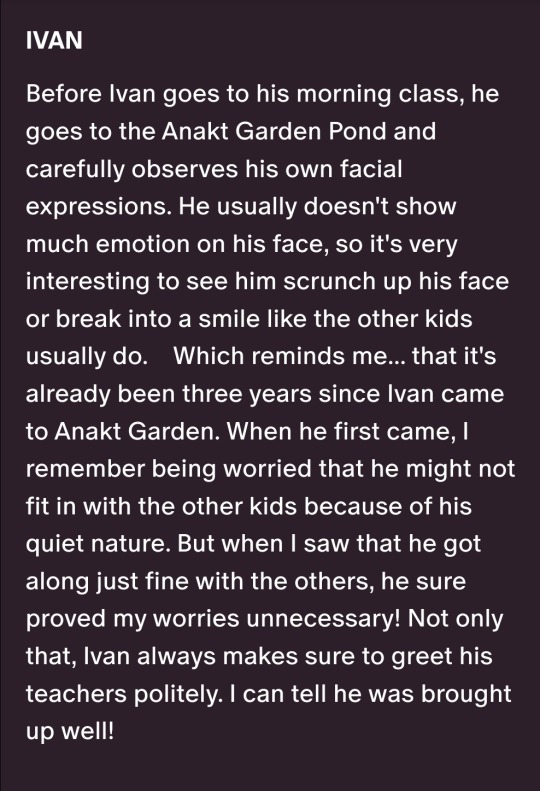
It's just. Classic ND behaviour to me.
Not only does expressing emotion and communicating the way other kids do not come naturally to Ivan, but it's not as if he's been given a great example of coping with this from the Segyein.
Ivan managed to mask in a way that made him popular with other students, and got him in the good graces of their captors. He did everything expected of him to survive and thrive in this environment.
Then he meets Till, inscrutable and very different to the other kids, just like Ivan is. Except, Till doesn't mask. He doesn't change or try to endear himself to their captors, and he doesn't bend to anyone, no matter how much he is hurt and punished for it.
This is a new situation for Ivan, and he's never had anything to compare his feelings to. He also can't figure out how to communicate with Till, every interaction, no matter how well meaning, seems to end in failure.
I bring your attention to the cheer up comic, and how, again, autistic this interaction feels:
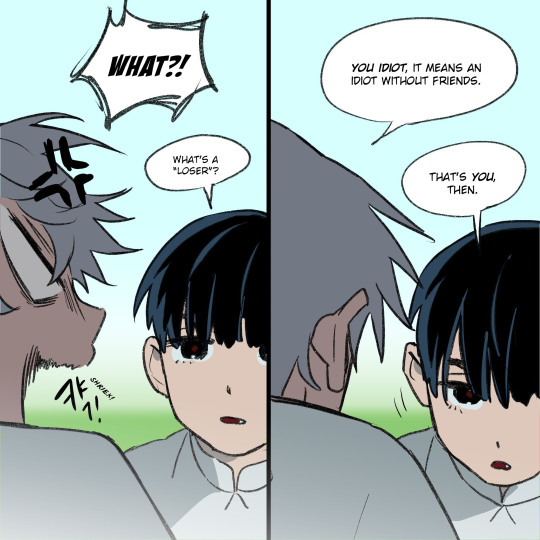

There could be many reasons why Ivan chose to say what he did, but to me it feels like ND bluntness not being received well. And that's fair! From Till's perspective Ivan is being a jerk for no good reason.
Instead of responding with glee towards Till laying him out (as we see from Ivan when they're a bit older), Ivan justs seems... really confused. Like he didn't expect that statement to upset Till that much, and he didn't expect Till to respond in the way he did. Everything was fine a second ago, what went wrong?

Then, Ivan uses the phrase he learned from Till in an attempt to self sooth. It might have been the first example of comfort after an injury/hurt he had ever seen, given how he defaults to it. And it was from Till trying to cheer up a flower.
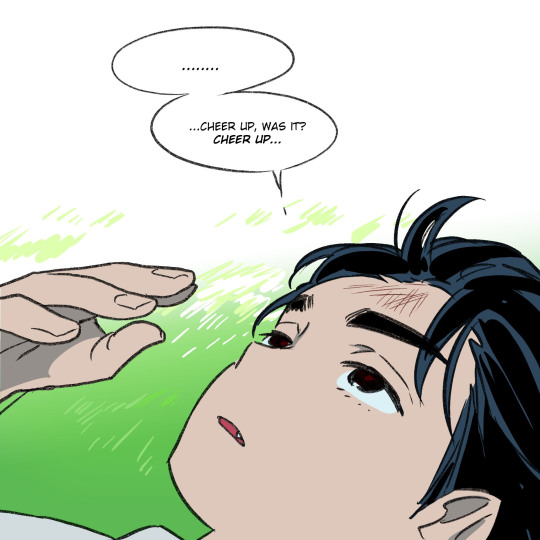
This also shows some of Till's blindspots. He has grown up having to be vigilant, because violence and hurt have been a core part of his upbringing. This leads to anything he doesn't immediately, clearly understand being perceived as a threat or a slight, and so he reacts violently to Ivan's statement.
I'll also draw your attention to this comic where, as far as we know, Ivan is simply stating a true fact in a blunt manner:

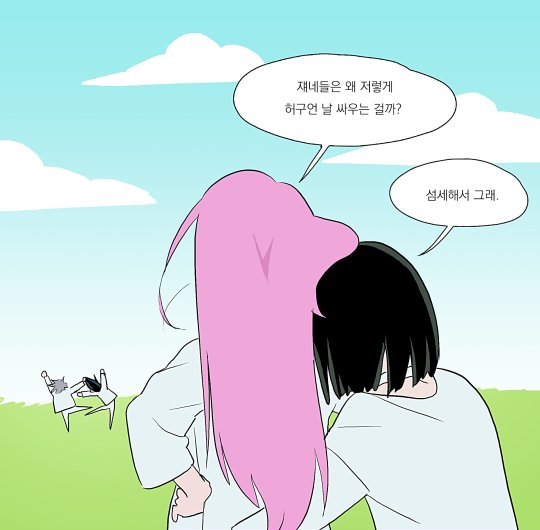
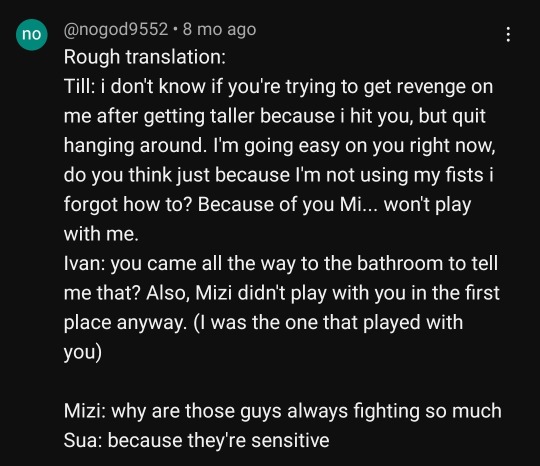
In my interpretation, these types of interactions keep adding up, and Ivan is grasping at straws the whole time, trying to be closer to Till and failing every time.
Eventually, the only surefire way to get Till's attention is to piss him off, provoke him, manufacture scenarios to talk to him. I'm not excusing this behaviour, but I understand where Ivan could be coming from, from the perspective of both an emotionally immature/stunted child and/or an ND child.
Despite how much they fight and bicker, at every moment it really mattered, Ivan was there for Till. It was always Ivan coming to free him, to take off his collar or gag, and it was Ivan who led their escape.
Ivan couldn't leave Till behind when he went back for Mizi. Even with the confirmation that Till would choose Mizi over Ivan every time, Ivan couldn't leave him.
The miscommunication goes two ways though. It's insane to think that Till didn't care about Ivan at all. They were close as kids, and I doubt Till ever forgot about the escape he gave up.
We have the graduation messages, where Ivan is able to write something that could be reasonably interpreted as affectionate or fond towards Till.
Meanwhile, Till's message-
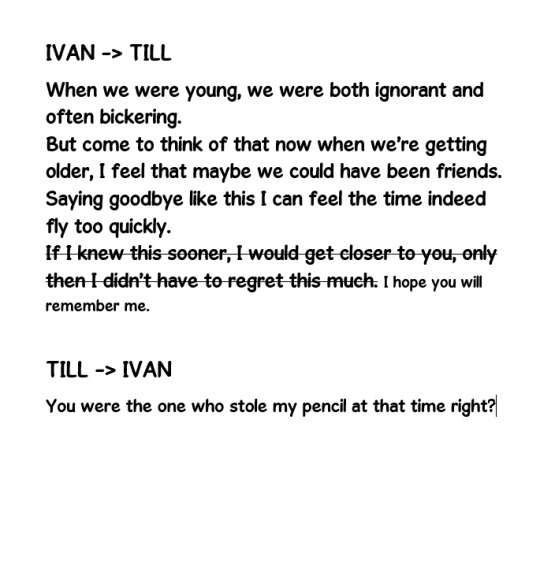
If we're being charitable with our interpretations, we can say this was Till's way of saying 'of course I remember you' and attempting to communicate that Ivan HAD left a lasting impact on him.
However, how could any reasonable person be expected to get THAT out of 'you stole my fucking pencil'? Ivan could have taken this one of two ways:
1) Omg he remembers me 🥰
2) he leans into his 'i will never be loved back' bias and thinks that Till really doesn't care about him at all
Who the hell knows what goes through that weird little brain of his. But given how Round 6 went, and what Ivan had to say in the confession comic, he obviously didn't think his impact was significant enough.
Then Alien Stage happens, and in Round 3 Ivan is FINALLY communicating his feelings in a way that is vulnerable and might even have a chance of being understood as love and yearning!
Till is unconscious through it until the very end.
Then in the next round, Mizi goes missing, and Till can't care about anything anymore.
Ivan finds him after the private performance, takes off his gag, and just holds him. Again, Till is unconscious for all of this.
Then, in Round 6, not only is Till distraught from the disappearance of Mizi, but he's given no time to process what the fuck is going on before Ivan is dead at his feet. Till might have finally had a chance to really understand where Ivan was coming from, how he really felt all this time, and Ivan DIES.
And still, Ivan's most transparent act of affection? It's delivered with violence. He's kissing a distraught Till who tries to push him away, and neither of them are happy. He puts his hands around Till's neck, not really hurting him, but it's enough to look convincing for the cameras, and it's enough for Till to go limp and wait for death. Ivan's final loving act is to give Till a soft look with blood pouring out of his mouth, that Till still does not see, and then let go before falling to the ground.
It's just a collection of failures. We see from Ivan that he truly loved Till, made a lot of selfless decisions for his sake, was filled with so much longing and affection, but he just couldn't get it across in a way that doesn't seem fucking deranged from an outsider's perspective. And when he DID manage to communicate his feelings more clearly, it was to a Till that was unconscious, or too distracted/dense/traumatised to see Ivan's actions as ones of love.
There's no guarantee that Till would have reciprocated even if Ivan had managed to communicate his feelings in a healthier way, but there was at least a CHANCE. At least Ivan could have gotten some closure, even if he was rejected.
Instead Ivan died thinking he was completely unloved by the person who he cared about more than anything else, and his last ditch effort to make Till understand was deeply flawed and uncomfortable.
If these kids had grown up any other way, maybe they could have had a chance. Unfortunately, the world they were in didn't equip them to not hurt eachother in their attempts to grow closer.
#alien stage#alien stage ivan#alien stage till#alnst#alnst ivan#alnst till#ivantill#tillivan#alien stage round 6#if you saw me edit this a bunch of times trying to link the masterdoc post no you didnt
569 notes
·
View notes
Note
I would actually like to know what you consider the basics of improv to be! If nothing else, you phrase these things really well and in ways I haven't heard before, and I'm also aware there's a lot of things I don't know (I'm in a student run college improv group, our theory might be a bit lacking)
Be glad to. A lot of improv stuff is just oral tradition at this point, passed down in musty school drama rooms and community centers, so everyone has to pick it up somewhere. When I've taught people before, beyond the basic definition of what an improv scene looks like, I usually focus on a set of do's and don'ts.
Do's:
Make offers, and make them good offers. A good offer should be strong and elegant, like a power lifter in a ball gown.
Broadly speaking, I'd say the strength of an offer refers to how much it establishes about the scene, and how much what it establishes is different from a theoretical "default" scene. Typically, you think about how much an offer is establishing in terms of the questions words: who are the characters, what are they doing, where are they, etc. An offer that establishes "two characters who are old friends since high school meeting up at a coffee shop to catch up" is establishing a lot, but it's still a weak offer because it's such a typical scene. You're not adding much that can't just be taken for granted.
When I say a good offer should be elegant, I mean that it should be as compact as possible while still doing a lot. The typical inelegant offer is verbose and unnatural. A character walks into a scene and says, "Hey, big brother Billy, I hope you're recovering from the illness you've had for the last six months, ever since our father died," or some other expository nightmare.
So, the best offers are both. They create a lot of unique, interesting details about the scene, and they do it quickly. Let's say you stagger into the scene, miming carrying something under your arm, and say, "Doctor! I've been decapitated again!" In five words, you've established who you and another character are, where you are, and why, and you've implied a lot of very unusual details about the scene, world, and your character's history.
When thinking about elegant offers, it's also worth noting that a lot of offers that you should be making are physical. Depending on the type of improv you're doing, you might be physically embodying objects and the environment, and if you're doing background like that you can add a ton of detail that the audience can pick up without friction. But even if you're not, you can establish location through miming actions, you can create details about your character through how you walk and hold your body, you can endow others with traits through how you physically react to them.
That brings us to the next do: make strong character choices and enhance other actors' characters. People have written whole books on what comprises a "strong character" but for improv purposes I'd focus on three details: quirks, status, and connections.
Quirks are fairly straightforward: what makes this character unusual? Establishing character quirks is the focus of a lot of improv games and exercises, and the best quirks are quick to establish, significantly inform the character, and are handled with enough sincerity to make the character compelling rather than only funny.
Status refers to how powerful and important a character is. High status characters will command the room, low status characters will be ignored or mistreated. Status might shift over the course of a scene. The sheriff is a high status character until the king shows up, for example. Status might seem like an obvious thing to figure out from a character's role, but it's useful to play with it. What does a low status king look like? What does an employee-boss scene look like if you decide your employee is higher status than the boss?
Connections refer to the relationships between characters. This is going to drive scenes more than most other character details, and you almost always want to avoid unconnected characters. Choosing a connection to an existing character is a very good first choice when entering a scene, as it should immediately suggest a direction for the scene to take. This is also a reason to favour unusual connections. If two actors are in a scene where they're arguing about a fender bender they've been in, you could choose to enter as one of their friends, but it'll be far more dynamic if you choose a more unusual connection. What if you're one of their anger management therapists? Their boss? Their dominatrix?
In addition to creating your own character, you should add to other actors' characters. The main way you do this is endowment, giving the character traits through your offers. Direct endowment is when you simply ascribe them a trait. If you say, "Bill, you've been mayor for the last ten years," then you're obviously giving them the trait of "mayor." But there's also indirect endowment, where you add something to a character through part of how you react to them. If you flinch when another character moves suddenly, you're endowing them with the traits of being dangerous and erratic. If you speak to them very slowly and simply, you're implying something about how intelligent your character perceives them to be.
Putting it all together, the last big thing to do is build up. There can be a temptation in improv to build out, to add new details to scenes that sort of sprawl outward from the original premise. Try to avoid that. When you add new details, make them ones that build on the existing details. Instead of adding new tensions or conflicts, raise the stakes of existing ones. Reincorporate and re-contextualize things that have already been established. Incorporate audience suggestions repeatedly, using them to colour other offers.
Don'ts:
No blocking. This is the one even people who don't know improv know. If someone adds something to the scene, go with it. Don't reject or ignore offers, incorporate and build on them.
No wimping. Whatever the scene is, whatever your character is, whatever offers are made, fully commit. Bring all your energy to it. If someone says your character is on fire, don't just stop, drop, and roll and then go back to whatever else was going on. That's wimping. Be the most on fire that you can be.
No dithering. When you're in a scene, always be adding to it or moving it forward. Saying something that just fills space, at best makes a joke, and doesn't add to the scene is bad form, it doesn't give other actors anything new to work with. If you're dithering, you're forcing other actors to pick up the slack. This is called "gagging" if you're being funny by not adding to the scene, and is a great way to be popular with the audience and have everyone else hate you, don't be that person.
Don't make yourself look good at the expense of your scene partners. It's okay to get laughs at the expense of other characters, but not at the expense of other actors. Help others get into the scene, develop their characters, and give them things to respond to, add onto their offers.
Related to the above, don't steal the spotlight. If there's a scene going on that you're not the focus of, you should be trying to figure out how to enhance what's going on. Everyone can tell when an actor can't bear to be in a supporting role, and it's not a cute look.
More than anything, don't betray the trust of other performers. All theatre requires trust, but improv requires so much trust. If you lose that trust, you're done, you've got nothing.
249 notes
·
View notes
Text
So, something happened last night that has been sitting heavily on my heart ever since. I'm not naming names for a reason, so don't ask. This is a clear example of something that's happened with increasing regularity.
When the Amsterdam attacks started happening last night, the first thing I thought of was a pair of my friends who had within the last 48h - I thought - been in Amsterdam to get married. (I got the place they traveled to wrong, bc it was late and I was tired, but that's not the point.) These friends are a Black frum Czech lesbian & her new wife, an in-progress convert who's seriously ill. I shared the CNN link on it & spoke with friends on a very small Discord server about how terrified I was that my friends had (again, I thought) narrowly missed being in the city while Jews were being advised to stay inside and, if they had to go out, to remove any visible symbols of their Jewishness.
Here's where I reach up and underline the word frum in that previous paragraph. Got it? Asking that friend to remove her visible signs of being Jewish is like asking her to go outside naked.
And here's the thing that's gonna stick with me for a long time: someone that I used to consider a longtime friend, who rarely, if ever, spoke on that server, popped up almost 4 hours after I was talking about how much this scared me about the relative safety of my friends to share a tweet containing the phrase Judeo-Nazis in order to contradict the CNN article and bring up what she apparently thought was the important part of the story:
"The Israelis started it," according to her & her "Judeo-Nazis" source.
That was what she thought was important to that story. Not that random fucking Jews are getting attacked on the streets of Amsterdam, not that I was relieved that my friends weren't in danger while still dealing with the fear and the shock of feeling they had been so close to it, but that I had to know, right away, that contrary to what CNN (and every other major news outlet talking about it) was reporting, this random person on Twitter referring to Israelis at a fucking soccer game and random visibly Jewish people of any nationality on the street in Amsterdam as Judeo-Nazis said that the Israelis fucking started it.
And like, no, they fucking didn't, but in context, the context in which I was speaking in a small group about my fear for two friends who weren't at the fucking soccer match but who I thought might be close to the danger, does that fucking matter? What does that have to do with "fuck, I think my friends were just there"?
Nothing. And yet - for some reason - that's the first thing that needed to be addressed in this person's mind.
A lot of Jews find our circles shrinking these days. Antisemitism is on the rise, and if we're not experiencing the direct slap in the face of people we thought were friends prioritizing "you know, the Jews started it" over anything else, we're watching people we thought better of make excuses for it, or tell us that we should gladly accept "our share" of the blame for the actions of a foreign government. (Yes, that has been said to me directly, recently.)
If I weren't so fucking stubborn, I would fold into myself & just keep company with the few and the trusted, a circle that gets smaller and smaller every day. But... I'm stubborn as hell. Maybe that'll fuck me over someday worse than it already has, I dunno.
I don't have a pithy closing for this. I'm just sad. It hurts to watch people that I used to trust vomit up shit like that tweet. It hurts that it's getting worse.
179 notes
·
View notes
Text
I originally wrote this back in 2019 in response to someone saying:
So, let me get this straight... the entire religion (of Judaism) is built around legal loopholes? Is that what I’m gathering here? (Feel free to correct me!)
And it remains relevant to people (gentiles) who characterize Judaism as rules lawyering or all about loopholes or worse, who imply we are trying to be "sneaky" or "pull one over on God."
My answer:
the religion is built around living in an ethical society per our contract (covenant) with G-d. but you can’t just have a bunch of words without putting them to use, & understanding them in practice, you know? the fulfillment of the covenant is a living discussion.
it’s not legal loopholes, because a loophole is often an inadequacy in the law that gets taken advantage of, but these are all built-in, part of our understanding. In this case, we have a contract (covenant), and we’re going to put it to use in every way possible, explore every inch of it, turn it inside out, and apply it to real life examples, define the parameters, argue those definitions, and then survey the conclusions.
I can say “you need to say the evening shema (a prayer) in the evening” but we can’t just say that, we need to explore a bunch of related things, like:
when in the evening does this happen? is there a difference between twilight and evening? if we say the evening prayer can be said from the time the priests partake of teruma, then when is that? if it’s the first watch of the evening, how many watches are there? if you were out all night for a wedding, but it’s not yet dawn, is it too late to recite the evening prayer? — IN SEVERAL THOUSAND YEARS, KE$HA WILL WRITE TIK TOK, AND WE’LL NEED TO KNOW WHAT TO DO IN CASE OF PARTYING UNTIL YOU SEE SUNLIGHT!
— when do they (the priests) ritually bathe in preparation for this [taking of teruma]? what about when poor people who cannot afford extra candles - do we consider how early they eat an evening meal in order to make sure they can afford the light [when we define evening]?
why did we discuss evening prayer before morning prayer? why does torah give us night before day? when is bedtime for most people? can we say the evening prayer until dawn? if yes, people might put off the prayer until dawn, which could lead to laziness or mistakes.
Also, when is dawn? but more prudently at the moment, when is evening? evening is when the stars are visible, but...how many stars? also, if you are lying alone in a dark house and can’t see the sky, how do you determine if it is too early or too late for your evening shema?
and that whole discussion is from the beginning of the Talmud, in its hyper-condensed form. That is what we do.
It’s not a series of loopholes and ways to weasel out of doing something. It's an intentional exploration of how something is done right, what doing it means, how we can accomplish it.
nothing gets taken for granted, everything is questioned, debated, discussed until it is understood enough to be applicable. and there may be lots of ways to understand.
if someone sees this line of thinking and goes “ah, loopholes to get out of it/wiggle away from it,” then you are mistaking lacework for loopholes.
....and if Kesha sees sunlight, it is now too late for her to say her bedtime shema. she should recite morning shema instead.
(note I think per anon my original phrasing was lacework, not loopholes, but maybe I edited for clarity later? Very possible, I'm a chronic editor.)
459 notes
·
View notes
Text
EFT Tapping Script Template for Void State, Manifesting & Shifting
.・。.・゜✭・.・✫・。.。.・゜✭・.・✫・゜・。.
This is an example EFT tapping script to use to clear your negative beliefs, calm your nervous system, and reprogram your mind with positive affirmations around entering the void, manifesting your dream life or shifting.
If you've never tried tapping before, this quick video demonstrates all the points you need to know. Some people don't use the wrist point and that's fine, I prefer to use it. You can also tap other places on the body, especially places that might hold tension like your lower back or shoulders.
Phase 1: Set-Up
Tapping sessions start off with a "set-up" on the side of the hand, where you tell yourself that even though you have all these negative thoughts, it's ok and you love yourself anyway.
The set-up phrase template is: "Even though I [have this negative thought/feeling/situation], I deeply and completely love and accept and forgive myself." It's usually repeated 3 times, but can go longer if you want.
It's best to use your own words, but this is the basic idea:
For void state: "Even though I think the void is hard to enter, I deeply and completely love and accept myself. Even though I have tried so many times to enter the void, and I keep failing, and I'm so frustrated and annoyed, I deeply and completely love and forgive myself. Even though I have tried so many methods and nothing is working, and I'm so mad that people make it seem so easy, and I feel like something is wrong with me, I deeply and completely love and accept and forgive myself. I'm willing to change the way I look at things. I'm willing to change my mind and my state. I'm willing to let go of the past."
For manifesting your dream life or shifting: "Even though I think it sounds impossible that I can wake up with all my desires/shift to my desired reality, I deeply and completely love and accept myself. Even though I have so many limiting beliefs from society, doubts that this is real, and people telling me this is ridiculous, I deeply and completely love and forgive myself. Even though I have tried so many methods and keep failing, and I wonder if I'll every be successful, and I feel like something is wrong with me, I deeply and completely love and accept and forgive myself. I'm willing to change the way I look at things. I'm willing to change my mind and my state. I'm willing to let go of the past,"
Take a deep breath, rub your hands together, drink some water.
Phase 2: Venting
Start tapping on the main points in a cycle and continue with the venting.
Void: "I have been trying to enter the void for so long. I haven't had any success. It's just so frustrating. It's just so hard. No matter what I try it doesn't work. Every morning I wake up disappointed that I failed to enter the void again. Why has it been so hard for me? Some people make it look so easy. It's just not fair. What am I doing wrong?"
Manifesting/shifting: "I have been trying to manifest my dream life/shift for so long. I haven't had any success or movement at all. Every morning I wake up in my same old reality and I'm so frustrated. I just want to wake up with all my desires. I'm just sick of this life. Why do some people make it look so easy? I've tried everything and keep failing. What's wrong with me?"
Continue venting for as long as you need. You might want to go through 2-3 (or more) rounds of the negative before you move on.
Phase 3: Bridging
Next I like to start making "bridging" statements. Like you're creating a bridge from your past negative state to your future one, you're gradually guiding yourself to feel better.
Example bridge for any: "I know I've been trying for a long time. But I also know I've had a lot of things to overcome. Yes, my life has been difficult. I know it's not my fault. I know I'm not doing anything wrong. I can't compare my journey to anyone else's. I don't know what they were going through before they had their success. But I do know I am in control of my future. No matter what happened in the past, I'm willing to believe I am in control now. I'm willing to believe that life can be easy for me. I'm open to believing that I can be successful."
You can continue to bridge as long as you need to. If you find your affirmations hard to believe, you can do a few rounds saying them starting with bridging phrases like:
Maybe I can start to believe that ____
I'm willing to believe ____
I am open to the possibility that ____
I can start to accept that ____
I choose to believe ____
Phase 4: Positive Affirmations
Finally, start using your positive affirmations and hyping yourself up.
Void: "It literally doesn't matter what happened in the past, because I am in control now. I was overcomplicating things because of tumblr and putting the void on a pedestal. I don't have to do that anymore. I know the void is real. I also know the void is no big deal. I know I enter the void every night when I sleep. I've entered the void a million times before. I know the void is just myself in my highest form. I know I am in control of the void because I am the creator. I know the void is easy to enter. I know I can enter the void easily no matter what."
Manifesting/shifting: "It literally doesn't matter what happened in the past, because I am in control now. I was overcomplicating things because of tumblr/ShiftTok and putting my desires on a pedestal. I don't have to do that anymore. I know manifesting/shifting is real. I know I am the creator of my reality and I can have anything I want. No desire or reality is more special, bigger or more important than any other. I know I can have whatever I want. I know I can shift/manifest easily. I am a master shifter/manifestor now. It's so easy for me to get all my desires."
Continue with the positive statements for as long as you want. In total the whole thing would probably take 10-20 minutes, but you can always go longer.
When you're done, rub your hands together or "Namaste", thank yourself for doing the work, and drink lots of water!!
462 notes
·
View notes
Text
Resolution to the summoner's mutiny is foggy, as I only understand what has 8een rel8ed to me through the 8rief answers I thought to solicit. Ultim8ely, the ire of the Condesce would 8e such that in the settling dust of the conflict, she would 8anish all from the homeworld, except the young. […] I cannot imagine how she would come to enforce such an upheaval in our civiliz8tion. Though I suppose she will have on her side the advantage of an unparalleled lifespan, and the leverage extended 8y the hideous psychic prongs of her deep undul8ing monstrosity.
Attention is drawn to the prodigiously long lifespan of the Condesce - the empress of Mindfang's time, and Feferi's probable ancestor. I used to think that the modern Empress was a different troll, but now that we're aware of fuchsiablood longevity, I'm pretty sure the two are one and the same.
Based on a line from Feferi's introduction, I was assuming that she was the only fuchsiablood in the universe - but let's take another look at the way that line's phrased.

You are 'the only of your kind' known to possess this blood.
That doesn't necessarily mean she's the only fuchsia troll, does it? For example, it might just mean she's the only Alternian with fuchsia blood, because the Empress doesn't actually live on the planet.
I really want this to be Mama Peixes, because the existence of a living Ancestor has so much story potential. Just how much does she know, and what's her agenda?
Nevertheless, I take the prediction as truth, and find it amusing that a homeworld domin8ed 8y children will 8e the gr8 summoner's legacy. One of them, at least.
Anyway, the Summoner - the boy who could fly - is the reason Alternia is a planetary Neverland, making it clear that he was the original inspiration for Pupa Pan.
It's also notable that we've only just started delving into Alternian history, and we've already learned about two massive rebellions against the social order. Contrary to what Alternians have been led to believe, this oppressive culture clearly isn't natural to them, and they've been fighting it every step of the way.
They don't want to be a murderous empire - they're forced to be, again and again and again.
More importantly, and less amusingly, his legacy will 8e my demise. You see, I first learned his name when I asked who would 8e the one to kill me.
And here's yet another layer to the Quest Cocoon Incident. Vriska wasn't content with living like Mindfang - she wanted to die like her, too.
Given that Vriska knew about the Summoner, one can only imagine how weird she must have been around Tavros. Not only was she constantly berating him, she was also putting him on this bizarre pedestal, comparing him to someone I'm damn sure he never knew existed.
And she'd never tell Tavros about the Summoner, either, because that would allow him to derive confidence from something other than her tutelage. No - she just silently compared him to a legendary hero, and he constantly failed a test he didn't know he was taking.

Seems like something's going very wrong in the Veil.
This seems like a sign that the session is on its last legs, and we're running out of time before it completely turns to static. We're entering the endgame.
The oracle I will resolve to part with. I will conceal it in a crypt 8earing the sign of the expatr8, with a map to its loc8tion hidden in this journal.
The cueball was sequestered in an Expatriate chest, which makes me speculate about whether Equius ever got his hands on it.
He can't see inside it himself - but like Mindfang said, it shouldn't be too hard to find a technological workaround, and Equius is a roboticist. I wonder if either Zahhak ever used it for themselves?
To whomever finds it, 8e wary, for the truth it tells may leave its new keeper 8lind as I was. Though no more.
She warned you, Vriska.
She told you it would leave you as blind as she was.


And it did.
165 notes
·
View notes
Text
WHAT IS THIS AU? HOW DOES IT WORK?
A brief (I'm lying, this is a long post) explanation post for this AU for anyone new <3
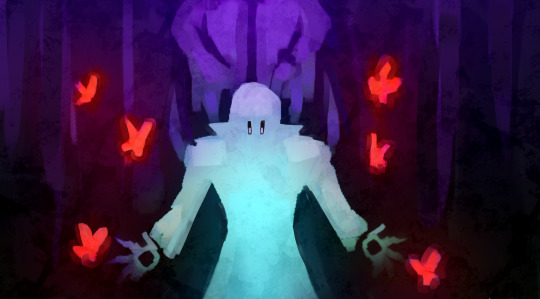
As I've mentioned before, this AU is based on the theory that Papyrus is (was) Gaster. I did not create this theory, it has existed for a long time nd I'm also not the first person to do something like this with the concept—I'll touch up on that later.
About the Papyrus is Gaster theory
I've looked up a lot of stuff about it but I don't actually know where it originated. It's not super popular but if you're a Papyrus theorist you might have heard of it before!
It is not a super serious theory, it's more about pointing out the weird connections and similarities between Papyrus and Gaster and giving an explanation to the many weird things about Papyrus and his lack of backstory.
Just to mention some things:
Them both speaking in capital letters, having no asterisks, their weird way of phrasing things, Papyrus being described as forgettable, Papyrus hating hotland, him pretending he doesn't know about a lot of stuff ( The lab for example, he know what a lab is but pretends he doesn't in front of Sans), Gaster being related to hands and Papyrus never taking his gloves off, Papyrus weird connection with phones (his photo-graphic memory for phone calls) and Gaster's weird connection to phones(Fun events related to phones, and getting the garbage noise when using the phone in a darkwolrd), their love for puzzles (The CORE is a giant puzzle), THAT one quote that I still find misterious “beside, it’s rude to talk about people that are listening, right? not everyone is as though as my brother”, Papyrus DOES have Gaster blasters it's pretty much canon even if a lot of people ignore it, Papyrus is very smart—he's knowledgeable on many subjects and knows how to build many things— he's the character with the MOST dialogue in the game yet we don't know a lot of stuff about him OR his past, he breaks the laws of physics and of the game, and he's not yet in deltarune! The heavily Gaster connected game!
That's some of the things I could think about, and look, yeah... I'm probably looking way too much into it and these are all just coincidences! The weird Papyrus things can be related to other stuff! But I still like this theory, not because I think it's real but because I LOVE the possibilities!!!
About how this AU works
This au is basically a
"Pretend this theory is real! How would the Undertale timeline work then?"
We're giving Papyrus his backstory while also making a Gaster-focused story at the same time!
This AU imagines how the Papyrus is Gaster theory situation could play out! (And I'll also add some of my other favorite ut theories as a treat)
Papyrus used to be Wingdings and then Wingdings shattered across time and space, Papyrus and Gaster are different separate people.
Actually I kind of, treat Wingdings before and after the accident as different people also... you change a lot when you become an omnipresent being....Wingdings, Gaster and Papyrus I treat them all as different people.
"How did Gaster become Papyrus?"
He didn't "become" Papyrus just like that. After he shattered, he stopped existing the way he did before, he became a being in another layer of the game! But! physically his body was just there...
This is based on how the Goners and Gaster followers have counterparts that are not, uh, goners. A non-distorted version of them existing separately

Papyrus was just kind an empty shell at first. He still kept parts of Wingdings original personality but his Papyrus personality developed on his own with time!
"How did Gaster shatter across time and space?"
Usually everyone agrees it was because he fell into the CORE
Not here! I don't think the CORE caused his accident, it is a power source not a time and space altering machine. In this story, it was some other thing he was working on....
If you have more questions you can check the frequently asked questions post or send me an ask <3!!
About similar content!
I've seen some people tell me this is a good idea for an AU and I agree!! I love this idea SO much, but as I said before I didn't create this concept or theory I just love it a lot!!
I really thought there would be more people that used this concept before but I couldn't find much... so I'm just making it myself!
One of my goals is to make other people like this idea as well and for them to make their own takes on it!
If you also like this concept as much as I do, here's a section with some inspirations for this AU that are also "Papyrus is Gaster" focused
First, you all should really see "I know that I know nothing" by Linssins
It's because of this comic that I discovered that theory in the first place! And really loved the concept. It's my main inspiration.
Unfortunately the comic is unfinished. If you see it, you will definitely see how I took inspiration... Still, the story in this AU is a very different take on the theory, it goes on a different path
Another inspiration was @askthesciencesquad ! This comic is paused but it's also a Papyrus is Gaster comic!
I was very happy to find it, it is also a very different take on the concept but I liked where it was going.
#forgettable-au#undertale au#papyrus!gaster#papyrus is gaster#undertale#HEHEHEHE#I FEEL LIKE I'M MISSING SOMETHING VERY OBVIOUS BUT EH#I hope this is a good explanation? I'm not sure if it is...#but you all tell me if there's something you need clarification on
599 notes
·
View notes